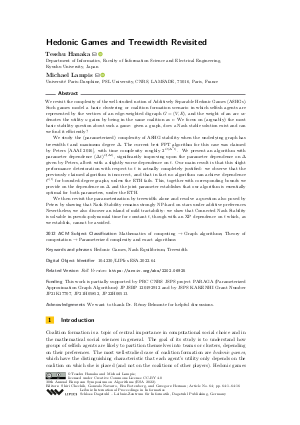LIPIcs.ESA.2022.64.pdf
- Filesize: 0.76 MB
- 16 pages

 Creative Commons Attribution 4.0 International license
Creative Commons Attribution 4.0 International license

We revisit the complexity of the well-studied notion of Additively Separable Hedonic Games (ASHGs). Such games model a basic clustering or coalition formation scenario in which selfish agents are represented by the vertices of an edge-weighted digraph G = (V,E), and the weight of an arc uv denotes the utility u gains by being in the same coalition as v. We focus on (arguably) the most basic stability question about such a game: given a graph, does a Nash stable solution exist and can we find it efficiently?
We study the (parameterized) complexity of ASHG stability when the underlying graph has treewidth t and maximum degree Δ. The current best FPT algorithm for this case was claimed by Peters [AAAI 2016], with time complexity roughly 2^{O(Δ⁵t)}. We present an algorithm with parameter dependence (Δ t)^{O(Δ t)}, significantly improving upon the parameter dependence on Δ given by Peters, albeit with a slightly worse dependence on t. Our main result is that this slight performance deterioration with respect to t is actually completely justified: we observe that the previously claimed algorithm is incorrect, and that in fact no algorithm can achieve dependence t^{o(t)} for bounded-degree graphs, unless the ETH fails. This, together with corresponding bounds we provide on the dependence on Δ and the joint parameter establishes that our algorithm is essentially optimal for both parameters, under the ETH.
We then revisit the parameterization by treewidth alone and resolve a question also posed by Peters by showing that Nash Stability remains strongly NP-hard on stars under additive preferences. Nevertheless, we also discover an island of mild tractability: we show that Connected Nash Stability is solvable in pseudo-polynomial time for constant t, though with an XP dependence on t which, as we establish, cannot be avoided.



























Feedback for Dagstuhl Publishing